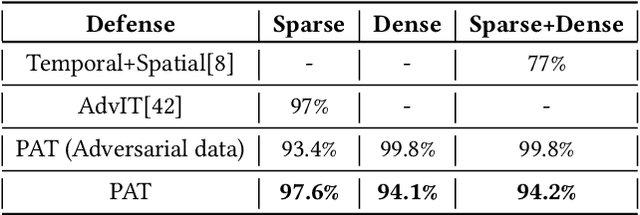PAT: Pseudo-Adversarial Training For Detecting Adversarial Videos
Paper and Code
Sep 13, 2021



Extensive research has demonstrated that deep neural networks (DNNs) are prone to adversarial attacks. Although various defense mechanisms have been proposed for image classification networks, fewer approaches exist for video-based models that are used in security-sensitive applications like surveillance. In this paper, we propose a novel yet simple algorithm called Pseudo-Adversarial Training (PAT), to detect the adversarial frames in a video without requiring knowledge of the attack. Our approach generates `transition frames' that capture critical deviation from the original frames and eliminate the components insignificant to the detection task. To avoid the necessity of knowing the attack model, we produce `pseudo perturbations' to train our detection network. Adversarial detection is then achieved through the use of the detected frames. Experimental results on UCF-101 and 20BN-Jester datasets show that PAT can detect the adversarial video frames and videos with a high detection rate. We also unveil the potential reasons for the effectiveness of the transition frames and pseudo perturbations through extensive experiments.
 Add to Chrome
Add to Chrome Add to Firefox
Add to Firefox Add to Edge
Add to Edge